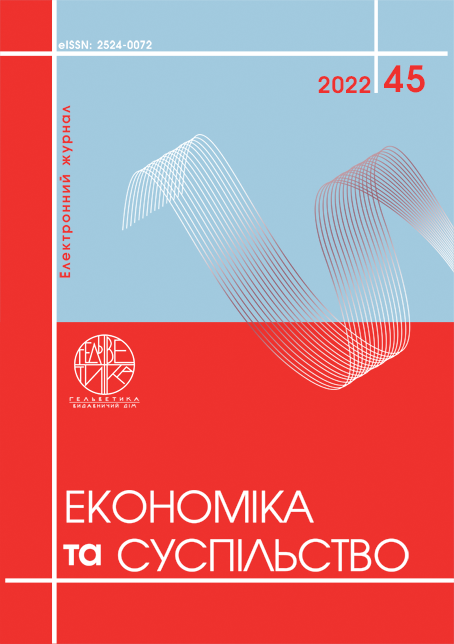ПЕРСПЕКТИВИ ВИКОРИСТАННЯ ІНСТРУМЕНТІВ СТИМУЛЮВАННЯ РАЦІОНАЛЬНОГО ВОДОКОРИСТУВАННЯ В УКРАЇНІ
Анотація
Стаття присвячена актуальним питанням оптимального використання виробничих, фінансових, кредитних, страхових, податкових, інвестиційних інструментів раціонального водокористування. Проаналізовано та систематизовано важелі прямої та непрямої дії щодо стимулювання ощадливого водокористування. Доведено що зазначені інструменти та важелі сприятимуть: формуванню екологічної відповідальності у всіх груп споживачів водних ресурсів зменшенню техногенних відкладень промислових та господарських об'єктів; підвищенню рівня очищення побутових стічних вод, що зменшить навантаження на каналізаційні мережі та забруднення підземних вод. Обґрунтовано, що раціональне водокористування має базуватись на безстічному водокористуванні, усуненні необґрунтованих втрат води, ощадливості у зрошенні культур, розмежуванні систем питного і технічного водопостачання, підвищенні культури водокористування, енергозбереженні тощо.
Посилання
В ООН заявили про серйозний дефіцит питної води на планеті. URL: https://www.dw.com/uk/v-oon-zaiavyly-pro-serioznyi-defitsyt-bezpechnoi-pytnoi-vody-na-planeti/a-56952151
Вода як джерело життя чи зародок війни. URL: https://ecoaction.org.ua/voda-iak-dzherelo-zhyttia.html
Хвесик М. А., Левковська Л. В., Сундук А. М. Системний підхід до економічної оцінки водних ресурсів України та її регіонів. Вісн. НАН України. 2016. № 7. С. 43–54. DOI: https://doi.org/10.15407/visn2016.07.043
Яцик А. В., Хорєв В. М. (Ред.). Водне господарство в Україні. Київ : Генеза, 2000. 456 с.
Орлов В. А., Волкова Л. А., Литвиненко Л. Л. Экологические аспекты использования поверхностного стока для подпитки систем оборотного водоснабжения промышленного предприятия. Экосистемы, их оптимизация и охрана. 2012. Вып. 6. С. 251–256.
Дерій Ж., Шадура-Никипорець Н., Юрченко М. Сучасні проблеми водокористування в контексті парадигми сталого розвитку. Проблеми і перспективи економіки та управління. 2021. № 4 (28). С. 92–101.
Wang, S.; Li, R. (2018). Toward the Coordinated Sustainable Development of Urban Water Resource Use and Economic Growth: An Empirical Analysis of Tianjin City, China. Sustainability, 10, 13–23.
Zhang, Z. L.; Xue, B.; Pang, J.; Chen, X. (2016). The Decoupling of Resource Consumption and Environmental Impact from Economic Growth in China: Spatial Pattern and Temporal Trend. Sustainability, 8, 222.
Wang, B. Q. (2015). Study on the Relationship between Chinese Economic Growth and Water Resources Based on the Decoupling Analysis. Master’s Thesis, Degree-Lanzhou University, Lanzhou, China.
Пономаренко Р. В., Пляцук Л. Д., Третьяков О. В., Аблєєва І. Ю., Буц Ю. В., Барбашин В. В. Удосконалення методології визначення якісного стану водної екосистеми (на прикладі річки Дніпро). Комунальне господарство міст. 2020. № 1 (154). С. 82–93.
Кичко І. І. Макроекономічний механізм фінансування охорони здоров'я. Фінанси України. 2003. № 4. С. 71–77.
Кичко І. І., Холодницька А. В. Сучасні підходи до водокористування з дотриманням принципів водної безпеки в Україні. Економіка та суспільство. 2022. Випуск № 38. DOI: https://doi.org/10.32782/2524-0072/2022-38-26.
Пшик Б. І. (Ред.). Удосконалення фінансово-кредитного стимулювання інвестиційної та інноваційної діяльності в Україні : монографія. Київ : УБС НБУ, 2010. 263 с.
Григор’єва М. І. Інвестиційна привабливість України: проблеми та можливості. Інвестиції: практика та досвід. 2013. № 21 листопад. С. 57–62.
Рекова Н. Ю., Талан Г. О. Інструменти регулювання інвестиційної діяльності в рамках податкової політики. Економічний часопис – XXI. 2014. № 1-2(2). С. 12–15.
Кичко І. І., Шаркаді Н. В. Захист депозитів населення. Фінанси України. 2006. № 2. С. 122–127.
V OON zajavyly pro serjoznyj deficyt pytnoji vody na planeti [The UN announced a serious shortage of drinking water on the planet]. Retrieved from: https://www.dw.com/uk/v-oon-zaiavyly-pro-serioznyi-defitsyt-bezpechnoi-pytnoi-vody-na-planeti/a-56952151
Voda jak dzherelo zhyttja chy zarodok vijny [Water as a source of life or the germ of war]. Retrieved from: https://ecoaction.org.ua/voda-iak-dzherelo-zhyttia.html
Khvesyk, M. A., Levkovsjka, L. V., & Sunduk, A. M. (2016) Systemnyj pidkhid do ekonomichnoji ocinky vodnykh resursiv Ukrajiny ta jiji reghioniv [A systematic approach to the economic assessment of water resources of Ukraine and its regions]. Visn. NAN Ukrajiny, 7, 43–54. DOI: https://doi.org/10.15407/visn2016.07.043
Jacyk, A. V., & Khorjev, V. M. (Eds.) (2000) Vodne ghospodarstvo v Ukrajini [Water management in Ukraine]. Kyiv: Gheneza, 456 p.
Orlov, V. A., Volkova, L. A., & Lytvynenko, L. L. (2012) Ekologicheskiye aspekty ispol'zovaniya poverkhnostnogo stoka dlya podpitki sistem oborotnogo vodosnabzheniya promyshlennogo predpriyatiya [Ecological aspects of the use of surface runoff for feeding systems of circulating water supply of an industrial enterprise].Ekosistemy, ikh optimizatsiya i okhrana, 6, 251–256.
Derij, Zh., Shadura-Nykyporecj, N., & Jurchenko, M. (2021) Suchasni problemy vodokorystuvannja v konteksti paradyghmy stalogho rozvytku [Modern problems of water supply in the context of the paradigm of steel development]. Problemy i perspektyvy ekonomiky ta upravlinnja, 4 (28), 92–101.
Wang, S., & Li, R. (2018) Toward the Coordinated Sustainable Development of Urban Water Resource Use and Economic Growth: An Empirical Analysis of Tianj'in City, China. Sustainability, 10, 13–23.
Zhang, Z.L., Xue, B., Pang, J., & Chen, X. (2016) The Decoupling of Resource Consumption and Environmental Impact from Economic Growth in China: Spatial Pattern and Temporal Trend. Sustainability, 8, 222.
Wang, B. Q. (2015) Study on the Relationship between Chinese Economic Growth and Water Resources Based on the Decoupling Analysis. Master's Thesis, Degree-Lanzhou University, Lanzhou, China.
Ponomarenko, R. V., Pljacuk, L. D., Tretjjakov, O. V., Abljejeva, I. Ju., Buc, Ju. V., & Barbashyn, V. V. (2020). Udoskonalennja metodologhiji vyznachennja jakisnogho stanu vodnoji ekosystemy (na prykladi richky Dnipro) [Improvement of the methodology for determining the qualitative state of the water ecosystem (on the example of the Dnipro River)]. Komunaljne ghospodarstvo mist, 1 (154), 82–93.
Kychko, I. I. (2003) Makroekonomichnyj mekhanizm finansuvannja okhorony zdorov'ja [Macroeconomic mechanism of health care financing]. Finansy Ukrajiny, 4, 71–77.
Kychko, I. I., & Kholodnycjka, A. V. (2022) Suchasni pidkhody do vodokorystuvannja z dotrymannjam pryncypiv vodnoji bezpeky v Ukrajini [Modern approaches to water use in compliance with the principles of water safety in Ukraine]. Ekonomika ta suspiljstvo, 38. DOI: https://doi.org/10.32782/2524-0072/2022-38-26
Pshyk, B. I. (Ed.) (2010) Udoskonalennja finansovo-kredytnogho stymuljuvannja investycijnoji ta innovacijnoji dijaljnosti v Ukrajini [Improvement of financial and credit stimulation of investment and innovation activity in Ukraine]: monograph. Kyiv : UBS NBU, 263 p.
Ghryghor'jeva, M. I. (2013) Investycijna pryvablyvistj Ukrajiny: problemy ta mozhlyvosti [Investment attractiveness of Ukraine: problems and opportunities]. Investyciji: praktyka ta dosvid, 21, 57–62.
Rekova, N. Ju., & Talan, Gh. O. (2014) Instrumenty reghuljuvannja investycijnoji dijaljnosti v ramkakh podatkovoji polityky [Instruments for regulation of investment activities within the framework of tax policy]. Ekonomichnyj chasopys – XXI, 1-2(2), 12–15.
Kychko, I. I., & Sharkadi, N. V. (2006) Zakhyst depozytiv naselennja [Protection of public deposits]. Finansy Ukrajiny, 2, 122–127.


